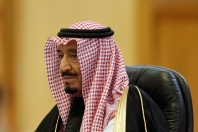Riyadh Rendezvous: Obama to Meet with New Saudi King
Simon Henderson/Wasington Institute
January 26, 2015
The length of the meeting and the names of the Saudi officials in attendance will reveal as much as any government communique or briefing on what subjects were discussed.
Tomorrow, January 27, President Obama will cut short his visit to India in order to meet with the new Saudi king in Riyadh and offer his condolences on the death last week of King Abdullah. Since Obama already congratulated King Salman on his accession via telephone on January 24, this meeting could be more substantive.
It is not the first time the two men have met. Salman was at King Abdullah’s desert camp outside Riyadh when Obama visited in March 2014 and also held talks in the Oval Office when he visited Washington in April 2012, before his appointment as crown prince later that year. The U.S. readout on the latter meeting was a model of brevity and generalities: the two men affirmed the strong and enduring partnership between their countries and discussed a range of bilateral and regional issues. Given the many reports that the seventy-eight-year-old Salman is no longer up to the job mentally, it will be interesting to see how long Tuesday’s meeting lasts and how engaged the monarch appears to be in media images.
President Obama will doubtless meet with other top officials as well, including Salman’s half-brother Crown Prince Muqrin and their nephew Muhammad bin Nayef (a.k.a. MbN), the new deputy crown prince. But the more interesting prospective attendee will be the king’s son Muhammad bin Salman, newly promoted to defense minister and head of the royal court. Still in his early thirties, MbS — as he will doubtless become known — has emerged out of nowhere in the past two years to become his father’s closest advisor. Apparently a bureaucratic infighter par excellence, he is credited with forcing the removal of four deputy defense ministers in fifteen months (see “Surprise Rotation of Saudi Defense Officials”). The last to go was Prince Khaled bin Bandar, who resigned in June 2014 after just six weeks on the job (see “Saudi Deputy Defense Minister Change Deepens Kingdom’s Leadership Crisis”). Khaled, who is yet to be replaced, was subsequently made head of intelligence by the late king. Despite the importance of this role to the U.S.-Saudi relationship, it is by no means certain that Khaled will be at tomorrow’s summit.
One certain absentee will be veteran foreign minister Prince Saud al-Faisal, who is recovering from recent back surgery in the United States. It is unclear whether his place will be taken at the meeting by the deputy foreign minister and late king’s son Prince Abdulaziz bin Abdullah, given his closeness to the former monarch. Also uncertain is whether another son — Prince Mitab, minister of the national guard, the kingdom’s largest military force — will be there.
The meeting will likely be an opportunity for King Salman to raise the profile of some of his other sons, a well-established prerogative of being monarch. Prince Khaled bin Salman is an F-15 pilot who took part in coalition raids on “Islamic State”/ISIS targets in Syria last September. Prince Sultan, head of the antiquities and tourism commission, was the first Saudi astronaut. Prince Abdulaziz is the long-serving assistant oil minister. Prince Faisal, who has a doctorate in international relations from Oxford, is the governor of Medina, the holiest city in Islam after Mecca.
One test of the meeting’s success could be the presence or absence of Prince Bandar bin Sultan, the former ambassador to Washington who served as head of intelligence until U.S. officials forced his removal last April because of differences over tactics against the Assad regime (see “Bandar Resigns as Head of Saudi Intelligence”). King Abdullah retained him as a special advisor, and he was a fixture of many top-level Saudi meetings, but his presence tomorrow would be anathema to the U.S. side.
Whatever the final communique says, the subjects most likely to be discussed tomorrow are Syria, Iran, ISIS, and oil prices. The most interesting question for President Obama will be whether King Salman and his team of advisors have an order of priority that differs from King Abdullah’s. The answer is unlikely to be shared publicly but could be reflected in U.S. policy in the coming months.
Simon Henderson is the Baker Fellow and director of the Gulf and Energy Policy Program at The Washington Institute.




















